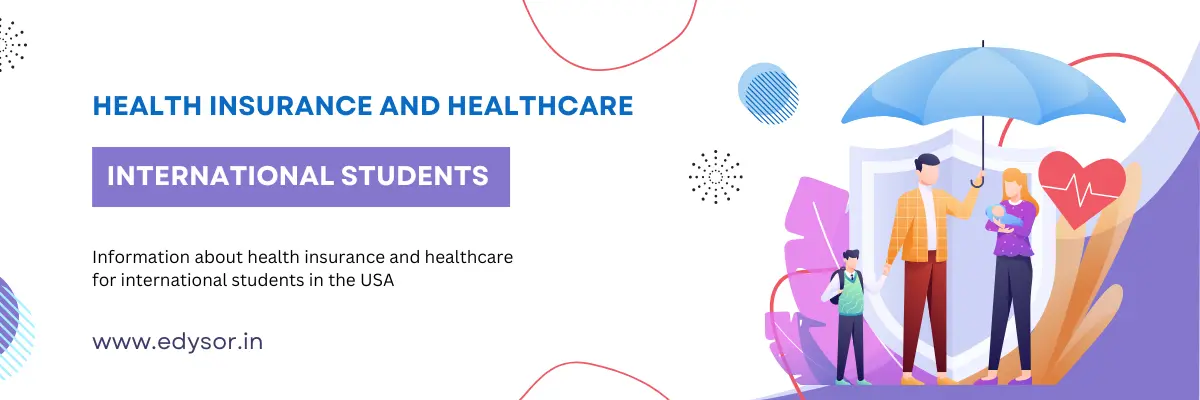11 Jul 2024 | Health Insurance and Healthcare in the USA
0
99
Understanding Health Insurance for International Students
Studying abroad in USA offers a wealth of opportunities, from academic excellence to cultural experiences. However, navigating the healthcare system and understanding health insurance requirements can be challenging for international students. This comprehensive guide provides essential information on health insurance and healthcare for international students in the USA, ensuring you are well-prepared for your study abroad journey.
Importance of Health Insurance
Health insurance is crucial for international students in the USA, providing coverage for medical expenses and ensuring access to quality healthcare.
Mandatory Requirement: Most universities require international students to have health insurance.
High Medical Costs: Healthcare in the USA is expensive, and insurance helps manage these costs.
Access to Care: Insurance ensures you can access necessary medical treatments without financial strain.
Types of Health Insurance Plans
International students have several options for health insurance in the USA, including university-provided plans and private insurance.
University-Provided Health Insurance
Comprehensive Coverage: Often includes a wide range of medical services.
Convenience: Integrated with university services and easier to manage.
Cost: May be included in tuition fees or require a separate payment.
Private Health Insurance
Flexibility: Allows you to choose a plan that fits your needs and budget.
Variety: Multiple providers offer different levels of coverage and benefits.
Comparison: Requires research to compare plans and select the best option.
Understanding the USA Healthcare System
The USA healthcare system is complex, with various providers, facilities, and insurance requirements.
Private Healthcare: Predominantly private, with public options available for certain groups.
Insurance-Based: Access to care often depends on your health insurance plan.
Network Providers: Insurance plans have networks of preferred providers to minimize costs.\
Accessing Medical Care in the USA
Knowing how to access medical care is essential for international students to maintain their health and well-being.
Types of Medical Facilities
Primary Care Providers (PCPs): First point of contact for non-emergency medical issues.
Urgent Care Centers: For non-life-threatening emergencies requiring immediate attention.
Emergency Rooms (ER): For serious or life-threatening conditions.
Specialists: For specialized care referred by your PCP.
Steps to Access Care
Find a Provider: Use your insurance plan’s directory to find in-network providers.
Make an Appointment: Schedule an appointment with your chosen provider.
Carry Insurance Information: Always carry your insurance card and identification.
Understand Copayments: Be aware of copayments and out-of-pocket costs for services.
Health Insurance Requirements for International Students
University Requirements
Most universities have specific health insurance requirements for international students, which may include mandatory enrollment in a university plan or proof of equivalent coverage.
Typical Requirements
Mandatory Enrollment: Automatic enrollment in the university’s health plan unless waived.
Waiver Option: Ability to waive the university plan if you have equivalent coverage.
Coverage Criteria: Insurance must meet or exceed the university’s minimum coverage requirements.
Coverage Details
Understanding what your health insurance covers is crucial to ensure you receive necessary medical care without unexpected costs.
Common Coverage Areas
Preventive Care: Annual check-ups, vaccinations, and screenings.
Emergency Services: Emergency room visits and urgent care.
Hospitalization: Inpatient and outpatient hospital services.
Prescription Drugs: Medications prescribed by a healthcare provider.
Mental Health: Counseling and mental health services.
Tips for Managing Health Insurance and Healthcare
Selecting the best health insurance plan involves comparing different options and considering your specific needs.
Coverage: Ensure the plan covers essential services like doctor visits, hospitalization, and prescriptions.
Network: Check if preferred doctors and hospitals are in the plan’s network.
Cost: Compare premiums, deductibles, and out-of-pocket costs.
Additional Benefits: Look for additional benefits like dental, vision, or mental health coverage.
Utilizing University Resources
Universities often provide resources and support to help international students navigate health insurance and healthcare.
University Resources
Health Services: On-campus health centers offering medical care and advice.
Insurance Office: Assistance with understanding and managing your health insurance.
Counseling Services: Access to mental health support and counseling.
Staying Healthy
Maintaining your health through preventive measures and a healthy lifestyle can minimize the need for medical care.
Regular Exercise: Incorporate physical activity into your routine.
Balanced Diet: Eat a nutritious diet with plenty of fruits, vegetables, and whole grains.
Adequate Sleep: Ensure you get enough rest to support overall well-being.
Stress Management: Practice stress-relief techniques like mindfulness and relaxation exercises.
For more assistance, please visit our study abroad consultancy services and explore our wide range of offerings for students interested in studying in the USA, studying in the UK, studying in Canada, studying in Australia, studying in Ireland, and many other countries.
Conclusion
Navigating health insurance and healthcare is a crucial part of preparing for your study abroad journey in the USA. Understanding the different types of health insurance plans, knowing how to access medical care, and utilizing available resources can help you manage your health effectively while studying in the USA. By staying informed and proactive, you can ensure a safe and healthy study abroad experience.


